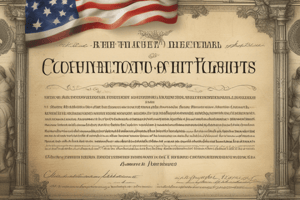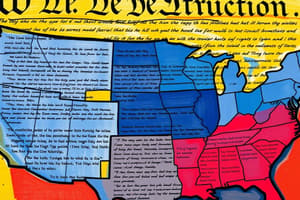Podcast
Questions and Answers
How could a citizen of the United States have been denied rights guaranteed by the Bill of Rights?
How could a citizen of the United States have been denied rights guaranteed by the Bill of Rights?
A state could have denied rights.
What did Federalists believe about the central government under the Constitution?
What did Federalists believe about the central government under the Constitution?
The appropriate amount of power it needed.
What presidential power under the Constitution led the Anti-Federalists to urge for a Bill of Rights?
What presidential power under the Constitution led the Anti-Federalists to urge for a Bill of Rights?
Veto power over acts of Congress
Why was it important that New York and Virginia ratify the Constitution?
Why was it important that New York and Virginia ratify the Constitution?
What was the difference between the Federalists and the Anti-Federalists?
What was the difference between the Federalists and the Anti-Federalists?
What did the Federalists argue?
What did the Federalists argue?
What did the Anti-Federalists argue?
What did the Anti-Federalists argue?
What did the Federalists believe about the Constitution?
What did the Federalists believe about the Constitution?
What does 'ratify' mean?
What does 'ratify' mean?
Who were the Federalists?
Who were the Federalists?
What are the Federalist Papers?
What are the Federalist Papers?
Who were the Anti-Federalists?
Who were the Anti-Federalists?
Flashcards are hidden until you start studying
Study Notes
Constitution and Rights
- Citizens could be denied rights guaranteed by the Bill of Rights by individual states.
Federalists vs Anti-Federalists
- Federalists supported the Constitution and believed in a strong central government.
- Anti-Federalists opposed the Constitution, fearing it created a too powerful national government.
Presidential Powers
- Veto power over acts of Congress alarmed Anti-Federalists, prompting calls for a Bill of Rights.
Importance of Ratification
- New York and Virginia's ratification was crucial for national unity, despite nine states already having ratified the Constitution.
Federalist Arguments
- Federalists contended that the Articles of Confederation resulted in a weak central government by allowing too much power to individual states.
Anti-Federalist Concerns
- Anti-Federalists argued that the Constitution weakened states and granted excessive power to the President.
Federalist Belief Systems
- Federalists maintained that the Constitution struck a balance by empowering the national government while protecting state rights.
Definitions
- Ratify means to approve.
- Federalists are supporters of the Constitution.
- Federalist Papers consist of 85 articles defending the Constitution, authored by Hamilton, Jay, and Madison under the pseudonym "Publius."
- Anti-Federalists are opponents of the Constitution and advocates for more state power.
Studying That Suits You
Use AI to generate personalized quizzes and flashcards to suit your learning preferences.




